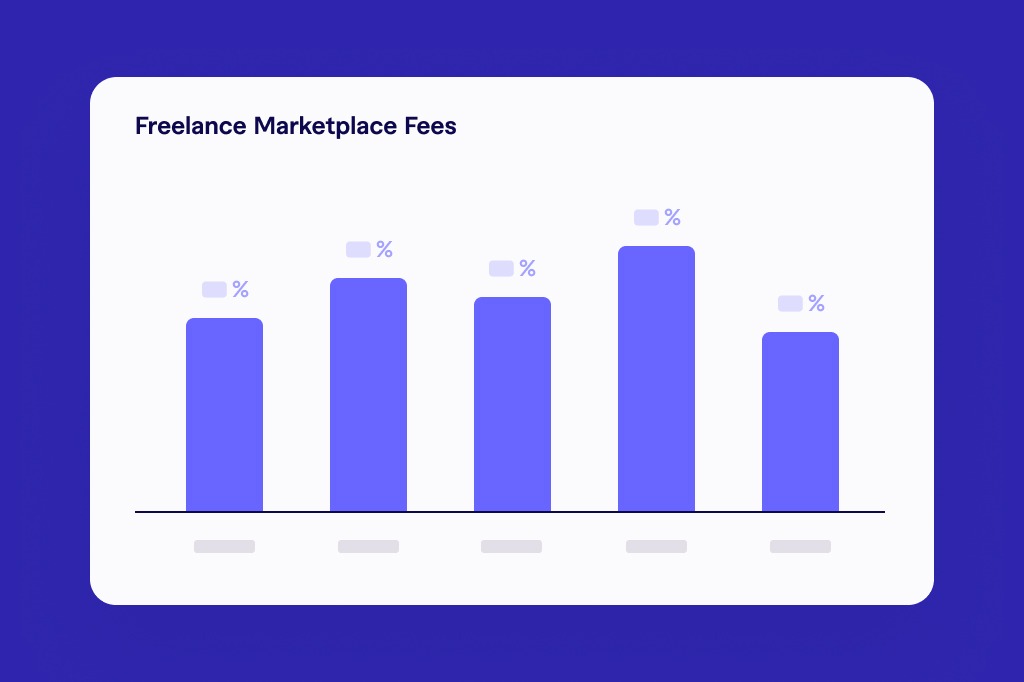The rise of freelance marketplaces has been a game-changer for businesses that have embraced the freelance revolution – but how do freelance marketplace fees impact your search for the best talent?
Fiverr, Upwork, and Freelancer.com are three of the biggest and most popular freelance marketplaces. There are millions of freelancers and gig workers providing services in more than 500 categories of work across these three platforms.
For businesses, freelance marketplaces promise to help you quickly find talent, fill skills gaps, and boost agility. In addition, they also simplify the process of working with freelancers as they help you find, pay international freelancers and also take care of all compliance issues (KYC checks, tax forms submission etc.)
However, Fiverr fees, Upwork fees, and Freelancer.com fees have a significant influence on the type of talent you can access through these platforms. As a result, fees also impact the extent to which you can realize benefits mentioned above.
If you’re considering using freelance marketplaces to search for talent, it’s important to understand how fees come into play.
This post is part of our guide on how to pay contractors.
How much are Fiverr fees, Upwork fees, and Freelancer fees?
Both freelancers and paying companies are responsible for paying fees to the freelance marketplace that they used to find the job. While the platforms usually charge a small service fee to companies, freelancers have to pay a larger commission on the income they earn.
Here’s a breakdown of the fees for Fiverr, Upwork, and Freelancer.
Fiverr fees
- Freelancers must pay a 20% commission on each gig they sell.
- Companies pay a 5.5% service fee of the purchase amount. For purchases under $50, an additional $2 small order fee is added. Fiverr Business include additional subscription fees.
Upwork fees
- Freelancers are charged a sliding fee based on their lifetime billings with each client. Service fees are the same whether the contracts are hourly, fixed-price, or by project, and decrease as costs increase:
- $0-$500: 20%
- $500.01-$10,000: 10%
- $10,000.01 or more: 5%
For example, on a $600 project with a new client, a freelancer’s service fee would be 20% on the first $500 and 10% on the remaining $100. After all of the fees, the freelancer would earn $490.
- Companies pay a 3% processing fee on each payment for basic services. Upwork plus and Upwork enterprise include additional fees.
Freelancer.com fees
- Freelancers pay a 10% fee on fixed-price projects, or $5 USD (whichever is greater). They also pay 10% of the total cost.
- Companies pay a fee of 3% for fixed-price projects or $3 USD (whichever is greater). For hourly projects, companies are also subject to a 3% fee.
How do freelance marketplace fees impact your search for talent?
The minor effect that too many companies focus on is the cost of processing fees. Although companies owe relatively small processing fees (3%-5.5%), this can certainly add up over time. However, the more significant effect to consider is how this commission-based system limits who is actually seeking work via these platforms.
The truth is, the best freelancers out there aren’t willing to give up any portion of their pay.
Top-of-the-line freelancers who offer highly valuable services and have steady demand will almost always rather manage their own job search and retain 100% of their income than pay such hefty commissions on their work.
On top of that, the best freelancers know that these marketplaces tend to draw a more price-sensitive crowd.
Talents that charge a premium for the skills and expertise might stand out as “too expensive” compared to their competitors on platforms like Fiverr and Upwork, not to mention the 20% commission becomes a much bigger cost burden.
In short, don’t expect to find freelancers and independent contractors who have years of experience and deep expertise in their domains working on freelance marketplaces. Most of them know they can fare far better by sourcing work through their personal networks or word-of-mouth recommendations.
When to turn to freelance marketplaces (and when not to)
There may still be many situations in which working with freelancers from Upwork, Fiverr, Freelancer, or any other freelance marketplace will be a suitable option. For example:
- If you need a super quick turnaround on a project.
- If the task isn’t overly complex—someone with basic experience would be adequate.
- You are facing an unexpected vacancy on your team, and you urgently need someone to fill the gap temporarily
There are countless talents from all around the world who can deliver great work, and many of them rely on platforms like Fiverr and Upwork despite the fees.
However, if you are looking for highly specific, complex, or ongoing work, you will be better off searching for a freelancer who works independently.
To find them, start by asking your personal network if anyone can recommend a great freelancer. Ask others on your team and in your organization to do the same. You can also try posting your requirements on LinkedIn, or reaching out to relevant freelancers that you come across from there.
Keep your friends close and your freelancers closer
Once you’ve found freelancers who can get the job done according to your standards, make sure you keep them in close contact.
Even if the project has ended and you don’t have a current need for their services, you may want to turn to them again in the future. By keeping track of all of the freelancers you hire and even staying in touch with them periodically, you can build up a highly qualified roster of talents who will enjoy working with you more down the road.
In doing so, you can avoid the limiting effects of freelance marketplace fees, maintain great relationships with top-tier talent, and bypass the “hunt” next time you need freelance support. Instead, you’ll know exactly who to call.
